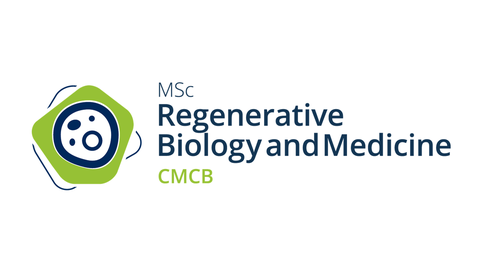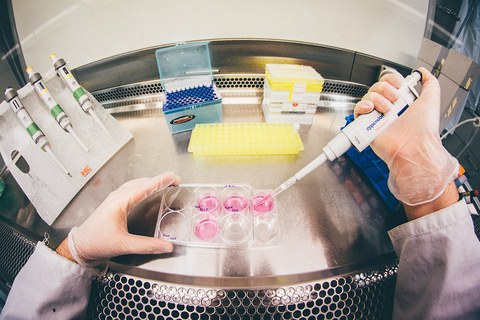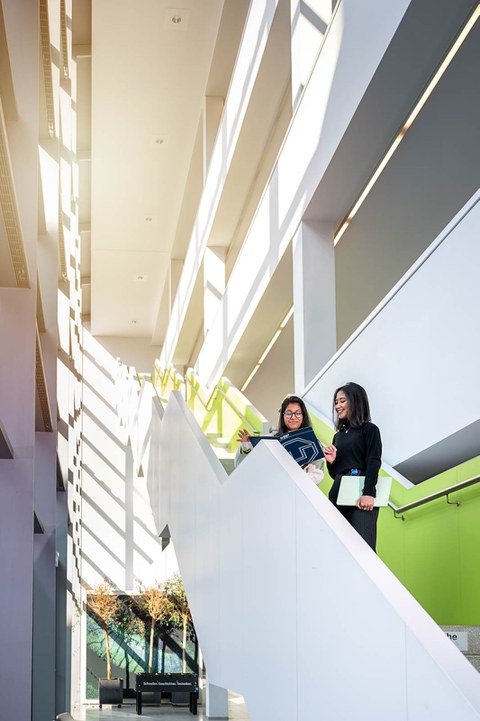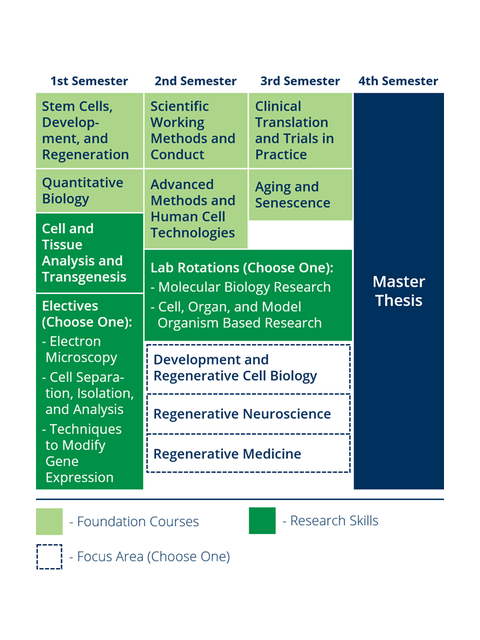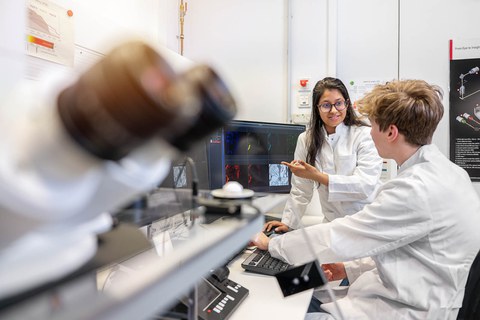Regenerative Biology and Medicine
Inhaltsverzeichnis
Regenerative Biology and Medicine at a Glance
| Degree | Master's of Science |
| Language | English |
| Tuition | None |
| Start | Winter Semester (October) |
| Duration | 4 semesters (3 semesters of coursework and lab classes + 1 semester for Master's thesis) |
| Internationality | Approximately 75% of the students come from countries outside Germany |
Why Regenerative Biology and Medicine Master's Program?
Regenerative Biology and Medicine is an international Master's program that has nurtured academia- and industry-ready graduates for over a decade.
Join us and discover how stem cells, molecular biology, and tissue engineering converge to shape the regenerative medicine of the future. Dive into one of the most rapidly developing fields at the interface of science and clinical practice.
Teaching Staff
During the course of the studies, you will be guided by renowned scientists from the Center for Regenerative Therapies Dresden. Their expertise is complemented by their colleagues from the Biotechnology Center (BIOTEC), the Medical Faculty Carl Gustav Carus, the Faculty of Mathematics and Science of TU Dresden, and the Max Planck Institute of Molecular Biology and Genetics.
Hands-on Experience
The Regenerative Biology and Medicine program is not your ordinary classroom experience. It is a fusion of theoretical classes and hands-on experience.
On top of various lab practicals, in the second and third semester you will have two extensive laboratory rotations. You will work on your individual lab project for 12 weeks side by side with leading experts at the Center for Regenerative Therapies Dresden (CRTD) and its cooperating institutes and clinics.
Internationality
Dive into an international environment, where approximately 75% of the students come from outside Germany, each bringing their own background and viewpoints.
Career Prospects
Our alumni excel both in academia and in industry, from local start-ups to global pharmaceutical companies.
The program's heavy emphasis on practice- and research-oriented projects makes sure that our graduates are able to handle diverse and complex tasks in research and development, spanning different fields such as cell biology, developmental biology, stem cell biology, and others.
The Regenerative Biology and Medicine Master's program sets the stage for academic career. Should you choose to stay in Dresden, the PhD Early Admission program offers the possibility of an earlier start within the Dresden International PhD Program (DIPP).
Curriculum
Experience a one-of-a-kind journey with the Regenerative Biology and Medicine program. Over four semesters, you will merge theoretical knowledge with practical, hands-on experience in the lab.
Read a detailed description of the curriculum here.
Three Focus Areas
After learning the fundamentals of regenerative biology in the first semester, you will transition to the second semester, where you choose one of three focus areas:
- Developmental and Regenerative Cell Biology - offers in-depth knowledge of the central molecular and cellular mechanisms of development and regeneration of tissues and organs of the most important model organisms and the associated current experimental analysis methods.
- Regenerative Neurosciences - covers in-depth knowledge of cellular, molecular, systemic, and regenerative neurosciences and the associated current experimental analysis methods as well as the clinical concepts of diseases for which neuro-regenerative therapies exist or are in development.
- Regenerative Medicine - offers in-depth knowledge of the pathology of diseases and the affected organ systems as well as the associated clinical concepts of regenerative medicine including the translation process from bench to bedside.
You can read more details about each focus area here.
Lab Rotations
Apart from numerous practicals throughout the course of studies, the second and third semester feature two extensive laboratory rotations. You will work side by side with leading experts at the Center for Regenerative Therapies Dresden (CRTD), its cooperating institutes and clinics to focus on your individual lab projects.
Master's Thesis
The entire fourth semester is dedicated to a Master's thesis. You can choose from a variety of research topics and work in the excellent research environment of the Center for Regenerative Therapies Dresden (CRTD) or reach out to research groups at other TU Dresden departments, the clinic, or partner institutes.
Application Requirements
We encourage highly qualified students of all nationalities to apply.
Applicants must fulfill the following requirements:
A first university degree in biology or medicine or another degree qualifying for a profession where comparable previous knowledge is needed, especially in molecular and cell biology.
- diploma of secondary school or university completed in English
- TOEFL: minimum 92 points internet-based
- IELTS: minimum 6.5
- certificates of other tests of equivalent standard will also be considered, e.g., UniCERT, CAE, CPE
- solid basic knowledge in biology or medicine and relevant laboratory experience
- interest in cell and molecular biology research with a clinical connection in the field of regenerative medicine
- inquisitiveness, initiative, and independent thinking
Please note that Chinese, Vietnamese, and Indian applicants need to provide the APS (Akademische Prüfstelle) from the Academic Evaluation Centre at the German Embassy.
The application period runs from April 1 - May 31 for admissions in winter term.
You'll find complete information on the application procedure on the How To Apply website below.
PhD Early Admission
Through a cooperation between the Dresden International PhD program (DIPP) and the three Master‘s programs, an Early Admission (following 3 semesters of study) to DIPP is possible for selected students. Decisions will be made based on performance and reference letters.
Admitted students may either directly enter the PhD program without completing the Master's degree or first complete the MSc, and then join the PhD program).
Supporting Study Documents
You can find the study documents for download below. Please note that the English documents are a courtesy translation and only the German version of the documents is legally binding!

